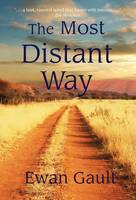 The Most Distant Way (Holland House Books, 200 pages) is the vibrant first novel of Ewan Gault, a young Scottish writer. His story is set in Kenya, home of the world’s best competitive runners, where two young Scots, Mike and Kirsten, are training at the high-altitude running center in the Rift Valley. Their private neuroses, presumably acquired in the West, and the novel’s pervasive concern with their physical bodies reflect the single-minded drive required of runners; the anxious self-involvement of the two Westerners; and the social chaos in the Kenyan locations of Eldoret, Mount Elgon, and Mombasa.
The Most Distant Way (Holland House Books, 200 pages) is the vibrant first novel of Ewan Gault, a young Scottish writer. His story is set in Kenya, home of the world’s best competitive runners, where two young Scots, Mike and Kirsten, are training at the high-altitude running center in the Rift Valley. Their private neuroses, presumably acquired in the West, and the novel’s pervasive concern with their physical bodies reflect the single-minded drive required of runners; the anxious self-involvement of the two Westerners; and the social chaos in the Kenyan locations of Eldoret, Mount Elgon, and Mombasa.
Mike is preoccupied by disease and the physical effects of running on the human body, his own in particular. When not investigating his pulse, blood pressure, hemoglobin levels, and possible organ dysfunction, he ruminates on the subject of tropical illnesses.
“Like Ebola, [Marburg Virus] had a biosafety level 4 rating, meaning there was no effective treatment; people infected died from multiple organ failure, haemorrhaging from orifices, that sort of thing. As an adolescent I had spent even more time reading about the effects of these diseases than I had looking at photos showing the symptoms of tropical STDs.”
In another passage, Kirsten tells us about Africa’s dire problems through the Kenyan character Zandra and, at the same time, reveals her own self-loathing:
“. . . Kenya could only prosper if the women had more power, how the pope was responsible for genocide because of his stance on condoms and that the only way to save Africa was to reduce the birth rate. These were all opinions and issues that I’d read lots about, and they must once have interested me. Now though, I couldn’t think of anything to say. [Zandra] could have been talking about the life cycle of May flies for all I cared. Our silence didn’t seem to bother her. She was like a preacher who didn’t care if anyone was converted. On and on she went about marital rape, the rights of adopted female relatives, enforced female circumcision. Occasionally I’d punctuate her tirade with a, ‘Shocking, how terrible, ghastly,’ in that disapproving voice British people use to signify that it is not the subject matter that is ghastly but the fact that someone was bringing it up in company. I felt like a cold-hearted bitch but couldn’t stop myself.”
Like Mike, Kirsten has her obsessions: smoking marijuana, not eating, and throwing up in secret. Africa (and England, it turns out) drains her emotionally. She tells us,
“Joyce and I didn’t actually like each other and when we were running or travelling rarely spoke. At best it could be said that we shared a cynical solidarity based around the pressures of having fathers who expected us to be good at something they were great at. But mostly our relationship was based on a shared love of smoking gargantuan.”
In another passage she says,
“The blunt crackled as some particularly pungent weed burnt. The smoke twined in creamy, loose pleats, then disappeared in frayed ends.”
Again:
“I tasted the wet from the afternoon’s storm with my tongue, and ground my knees and fingers into the earth. On the other side of the camp the South Africans were singing their Oompa Loompa songs.”
This kind of observant, evocative writing appears often in The Most Distant Way.
As we read to see how these two protagonists will manage their excesses (and their quasi boyfriend-girlfriend relationship), Galt’s incisive and lyrical prose is introducing us to the heart of Kenya and to the disorder in the two Brits’ lives. Kirsten thinks to herself,
“We travelled through the great hills of the Rift Valley, over land that humans had lived on for a million years, through villages that looked like something that had been thrown together in the last couple of days. A little bus full of light and foreign smells rattling across a pitch black land. I gloried in the fact that no-one at home knew of my travel plans, that if we rolled down one of the drops at the roadside I might never be identified.”
Later, back home in Scotland, Mike seems curiously cool and remote, perhaps, like Kirsten, drained by his African experience. Or is it that the West is emotionally arid? (“. . . Britain is fat and decadent now. Its glory days are over.”)
There are a few loose passages where this reader feels slightly adrift, such as a golf game with a sketchy secondary character. And if the plot suggested by Kirsten’s photographs in early chapters pales (and is eventually dropped altogether) in comparison to the personal dilemmas of the two young protagonists, the splendidly written scenes of a marijuana high, a visit to a prostitute, and a trip to the local hospital distract us from occasional sketchiness and plotting lapses. These weaknesses are minor compared to the well-drawn characters of Mike and Kirsten who fully engage us. Throughout, Kenya is a vigorous, captivating presence.
This is the first novel of a talented writer.
—Marlene Lee, author of The Absent Woman (2013) and Rebecca’s Road (2013)
Pingback: A new review | Ewan Gault
Marlene,
Nice review. I always enjoy books with fully developed characters and some internal soul-searching. Sounds like I should put this one on my list.